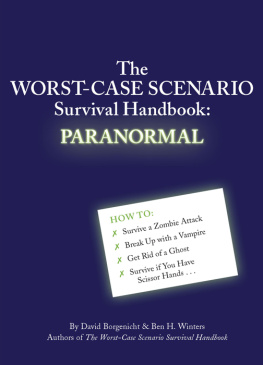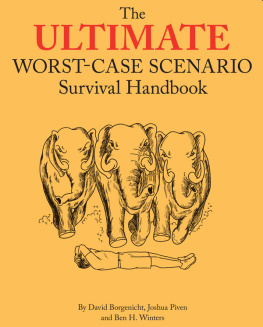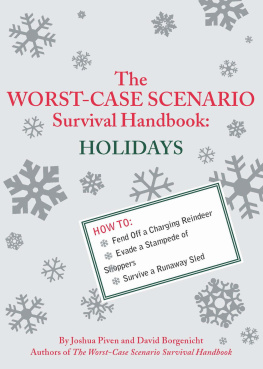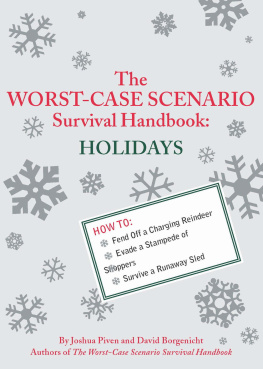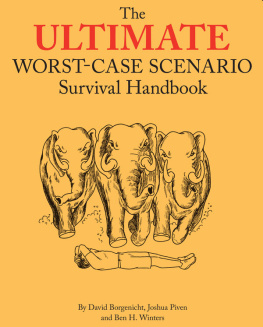
The
WORST-CASE SCENARIO
Survival Handbook:
COLLEGE
The
WORST-CASE SCENARIO
Survival Handbook:
COLLEGE
By Joshua Piven, David Borgenicht, and Jennifer Worick
Illustrations by Brenda Brown

Copyright 2004 by Quirk Productions, Inc.
All rights reserved. No part of this book may be reproduced in any form without written permission from the publisher.
Worst-Case Scenario and The Worst-Case Scenario Survival Handbook are trademarks of Quirk Productions, Inc.
Library of Congress Cataloging-in-Publication Data available.
eISBN: 978-0-8118-7323-9
Illustrations by Brenda Brown

A QUIRK Book
www.quirkpackaging.com
Visit www.worstcasescenarios.com
Chronicle Books LLC
680 Second Street
San Francisco, California 94107
www.chroniclebooks.com
WARNING
When a life is imperiled or a dire situation is at hand, safe alternatives may not exist. To deal with the worst-case scenarios presented in this book, we highly recommendinsist, actuallythat the best course of action is to consult a professionally trained expert, most likely not an academician. But because highly trained professionals may not always be available when the safety or sanity of individuals is at risk, we have asked experts on various subjects to describe the techniques they might employ in these emergency situations. THE PUBLISHER, AUTHORS, AND EXPERTS DISCLAIM ANY LIABILITY from any injury that may result from the use, proper or improper, of the information contained in this book. We do not guarantee that the information contained herein is complete, safe, or accurate, nor should it be considered a substitute for your good judgment, your common sense, or everything your parents ever taught you. And finally, nothing in this book should be construed or interpreted to infringe on the rights of other persons or to violate criminal statutes; we urge you to obey all laws and respect all rights, including property rights, of others, even members of other fraternities and sororities, the faculty and administration, and visiting teams and their mascots.
The Authors
I have never let my schooling interfere with my education.
Mark Twain
CONTENTS
INTRODUCTION
Dozens of images come to mind when you think about college life. Professors. Fraternities. Tweed jackets with suede elbow patches. Parties. Football games. Backpacks loaded with books. Parties. Intense seminars. Sororities. Huge, hushed classrooms filled with students taking tests. Parties. All-night cram sessions. Wool sweaters/surfboards (depending on region). Beverages. A blinking cursor on a blank computer screen. The homecoming parade.
To be sure, heading off to college for the first time is one of lifes great milestones. Youre finally leaving the nest, heading out on your own to choose your own path. Youre ready to learn what it takes to succeed, to explore your inner self, and to figure out what you really want to be. The world is your oyster if only you can figure out how to shuck it.
Thankfully, first-time college students have a variety of resources at their disposal to help them prepare. Guidance counselors, alumni, faculty advisors, resident advisors, and campus tour guides do their best to give students a sense of whats in store. And when it comes to the basics, they do just fine. They are perfectly capable of preparing you for the more common challenges youll face at schoolhow to pick a major, how to add or drop classes, how to improve your study habits, and how to find your way around campus. Your mom can teach you how to do your laundry and heat up canned soup, and your high school teachers should be able to give you the basic study skills youll need.
But what about when college life takes a sudden turn for the worse?
Who do you go to when you discover you have a nightmare roommate, or when youre served a tray of completely unrecognizable and probably dangerous institutional food? How do you deal with a thoroughly gross dorm bathroom, or open a bottle without an opener? Whats the best way to ask your parents for money, and how do you survive the walk of shame? What do you do if youve never attended a class and now you have a test?
Thats where we come in.
With expert advice from experienced bartenders, truckers, lifeguards, safety instructors, bail bondsmen, poison control workers, and, of course, professors, admissions officers, and psychologists, among many other experts, The Worst-Case Scenario Survival Handbook: College is your guide. It is required reading for every student.
Weve organized the book into four sections Getting Settled, Room and Board, Extracurricular Survival Skills, and Class Survivaland have included an appendix with extra special aids: Because we know that sounding smart can be even more important than being smart, weve provided an easy-to-use pronunciation guide to philosophers, artists, and writers with weird names. The appendix also includes a useful letter/speech to tell your parents that youve been expelled. And should all else fail, theres a more-or-less realistic-looking diploma (you fill in your name) that you can enlarge on a photocopy machine, frame, and hang.
Whether youre attending a small college or a large university, living in a dorm or off-campus, or are a freshman or a senior, you still must survive your college experience. This book tells you how.
The Authors
CHAPTER 1
GETTING SETTLED
HOW TO AVOID GOING TO THE WRONG COLLEGE
1 Visit the college during the school year on a day with a regular class schedule.
Visiting during holidays, homecoming, or other times when students are away or not in their normal routine will not give you an accurate picture of everyday life at the school.
2 Observe the students.
Are the students walking energetically to class while talking animatedly, or are the few students in sight wandering aimlessly?
Are the students bright-eyed, with glowing complexions, or are they red-eyed, with a pasty pallor?
Are the students carrying armfuls of books and notebooks, or are they carrying surfboards and coolers?
Are the students eagerly seeking out professors after class and in the cafeteria, or are the students ducking into doorways and under tables to avoid professors?
Are students in class paying attention and taking notes, or are they wearing headphones, reading the newspaper, or dozing?
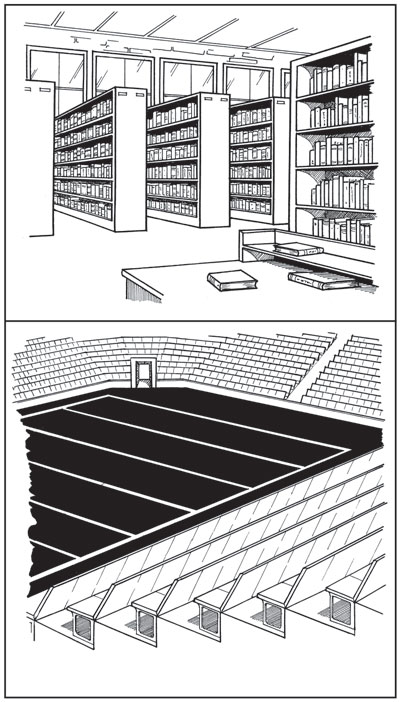
Compare the number of books in the library to the number of seats in the stadium.
3 Evaluate the facilities and surroundings.
Compare the number of books in the library to the number of seats in the stadium.
Compare the number of flyers promoting free lectures to the number of flyers promoting spring break getaways.
Compare the number of nearby art galleries to the number of nearby hair salons.
Compare the number of nearby bookstores to the number of nearby bars.
Next page


